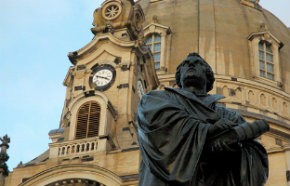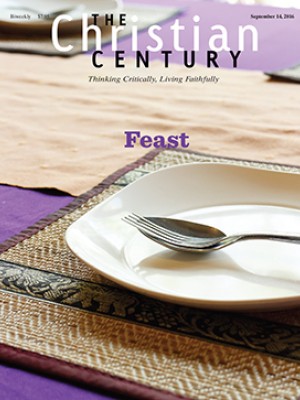Remembering the Reformation—with the pope
"A commemoration, not a celebration." What does this mean?

On October 31 in Lund, Sweden, Pope Francis will take part in a commemoration of the 500th anniversary of the Protestant Reformation—a year before the official anniversary in 2017. That a pope would participate in a commemoration of Luther’s posting of his 95 Theses on October 31, 1517—the event usually seen as the beginning of the Protestant Reformation—is a sign of how far ecumenical relations have come. But the path to the commemoration has had its bumps, and the event is significant both for what it is and what it isn’t.
Sponsored by the Lutheran World Federation and the (Lutheran) Church of Sweden, the commemoration will consist of a prayer service in the Lutheran cathedral in Lund and an event at an arena in nearby Malmö.
Earlier commemorations of 1517 were exclusively Protestant and often strongly anti-Catholic. Talks began in 2007 between the Lutheran World Federation and the Vatican about how the 2017 anniversary might be genuinely ecumenical.
The international Catholic-Lutheran dialogue took up the question and in 2013 produced From Conflict to Communion, which provides background for the joint commemoration. The text locates Luther’s theology in the context of late medieval “piety theology,” which focused more on moving the person into a right relation with God than on objective scholastic precision about the nature of that relation.
Read our latest issue or browse back issues.
From Conflict to Communion tells the early history of the Reformation in a way that both Lutherans and Catholics can find accurate, without attempting to justify one side or the other and with a clear apprehension of the mistakes on both sides that blocked reconciliation. A chapter is given to describing basic themes in Luther’s theology in the light of both recent scholarship and ecumenical dialogue. The goal is less an agreement that what Luther said was true or false and more an agreement on what Luther actually said and meant—not a small achievement. While any interpretation of Luther will be criticized on details, the chapter is an excellent brief summary.
The Reformation was an inherently contrastive event, however. It was a protest, and protests live off contrast with what they protest against. Ecumenical discussions have reached striking agreement, but there are still differences of doctrine and practice embedded deep in Protestant and Catholic identities. The question remains: How close does an ecumenical commemoration of the Reformation come to being a celebration of the Reformation, something Protestants will inevitably wish to do to some extent, but which remains problematic for Catholics?
The challenges quickly became evident in planning the largest of Reformation commemorations, those taking place in Germany. A “Luther Decade” began there in 2008, a well-funded cooperation of various government and Protestant church agencies to celebrate the Reformation events (and, not coincidentally, attract tourists). The decade will culminate in a Reformation Jubilee in Wittenberg on October 31, 2017.
Could Catholics participate in a Jubilee, celebrating the event that, whatever else might true about it, led to the largest division in Western Christian history? When asked that question, Cardinal Kurt Koch, president of the Pontifical Council for Promoting Christian Unity, was blunt. One “should not speak of a jubilee, but of a Reformation commemoration, for we cannot celebrate a sin.”
Further problems arose over a text prepared as a theological foundation text for the 2017 events. Justification and Freedom, prepared by the Evangelical Church in Germany, is part of the recent German Protestant attempt to present a sharper profile, placing emphasis on what makes Protestantism distinctive. When the document refers to the Reformation commitment to a “church of freedom,” it takes little imagination to guess who might be cast as the “church of unfreedom.”
Against that background, the nature of the event planned for Lund comes into sharper focus. The Lutheran World Federation has consistently used language of commemoration rather than celebration to describe it. That the event will take place in Sweden, not Germany, is not a trivial matter. Historically, Sweden is an almost entirely Lutheran country and one without a tradition of sharp confessional conflicts. And holding the commemoration in 2016 distances it from the inevitably celebratory events on October 31, 2017.
What will be said and done during the prayer service and following event in Sweden? Swedish Lutherans have kept much of the Western tradition of liturgy and vestments, and the Lund cathedral has kept its medieval appearance, so both Catholic and Lutheran will find the setting comfortable. One difference will be evident, however; the primate of the Church of Sweden, the archbishop of Uppsala, Antje Jackelén, is a woman.
The service will based on the resource “Common Prayer,” created by the international dialogue group that produced From Conflict to Communion. “Common Prayer” emphasizes “thanksgiving, repentance, and common witness and service.” Just what is being repented of? And even more, for what exactly is each side giving thanks?
“Common Prayer” refers to “our mutual joy for the gifts received and rediscovered in various ways through the renewal and impulses of the Reformation.” The phrase “in various ways” leaves open a wide range of interpretation. Some conservative Catholics have already complained about the very notion of giving thanks for anything related to the Reformation.
While including elements of repentance and thanksgiving, “Common Prayer” puts greater emphasis on common witness. Ecumenical dialogues have brought out how much Lutherans and Catholics share in their understanding of the gospel. One can also expect an emphasis on the role of the church in a conflict-torn world. The event in Malmö might include a focus on the cooperation between the large service and aid organizations of the Vatican and the LWF.
Whatever the details, the sheer fact of a pope participating in a commemoration of the Reformation will be the headline event. It is a sign that even in a period when ecumenical hopes are modest, the fundamental affirmations of ecumenism are still in place.
A version of this article appears in the September 14 print edition under the title “Catholics at the gathering.”






